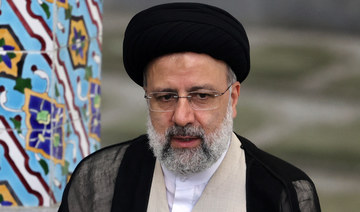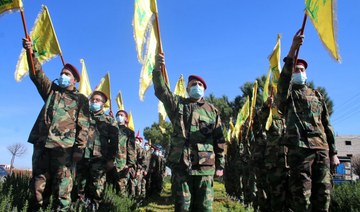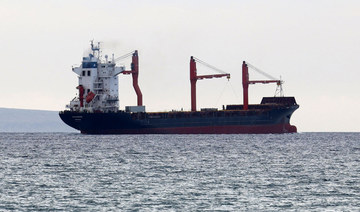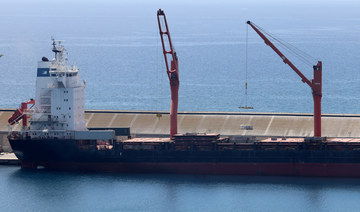LONDON: Hezbollah has used its financial backers in Iran and its significant military arsenal to “permeate the Lebanese state,” according to a paper launched this week.
The paper — authored by Lina Khatib, director of London-based think tank Chatham House’s Middle East and North Africa program, and launched at an online event on Thursday attended by Arab News — details how Hezbollah morphed from a resistance group against Israeli occupation to a hybrid power holding the Lebanese state in an ideological stranglehold.
“Hezbollah has spread its influence throughout the Lebanese state, from the presidency of the republic to representative political institutions and the civil service, as well as Lebanon’s military and security institutions,” the paper said.
“This influence is due to a number of factors: Hezbollah’s benefiting from a reliable external patron — Iran — unlike other parties in Lebanon; Hezbollah’s capacity in terms of organization, funding, physical resources and numbers of followers, which dwarfs that of other Lebanese parties.”
Other means used by Hezbollah, the paper said, include the “weakness of the Lebanese state” and the existence of “a political system based on elite pacts.”
Opinion
This section contains relevant reference points, placed in (Opinion field)
Khatib told event attendees that she urges analysts, particularly in the West, to take a “nuanced” approach to understanding the relationship between Lebanon and Hezbollah.
“While Hezbollah is a contributing factor to the weakness of the Lebanese state, it’s also a product of the political system in Lebanon,” she said.
“As long as the current political system in Lebanon continues to exist, it won’t be possible to reverse Hezbollah’s sway over the Lebanese state.”
Khatib said the characterization of Hezbollah as a “state within a state” — popular in academic and policymaking circles — is inaccurate.
This characterization “implies that Hezbollah is operating in a way that’s completely detached from the Lebanese state at large. Instead, what I argue is that Hezbollah permeates the state in Lebanon,” she added.
“And when we say ‘the state,’ I’m not just talking about the state institutions, I’m also talking about the state as the space for the contestation of power in Lebanon.
“This, I think, is vividly illustrated by how Hezbollah, unlike other groups in Lebanon ... has surveillance capacities. That means it’s monitoring not just what happens inside state institutions, but it’s monitoring its allies and its opponents in all kinds of arenas: Cultural, social, education, economic. This is something that gives it a huge tactical advantage.”
Khatib said other parties also take advantage of the Lebanese state for their own benefit, but “it’s Hezbollah, unlike the others, that has coercive power over both its opponents and its allies — this also gives it the edge.”
Mona Yacoubian, a senior advisor at the US Institute for Peace, said Hezbollah moved from “the crucible of resistance to Israeli occupation” at the end of the 20th century, to becoming the “praetorian guard of Lebanon’s corrupt, cronyism system.”
Hezbollah is different from other parties in the country “by virtue of its arms, and that these arms sit outside the gambit of state control,” she added.
Despite being a late arrival to the Lebanese political scene, Yacoubian said, the Shiite group has “adopted and emulated some of the most corrupt practices of Lebanon’s political class, and in a sense has become completely enmeshed with Lebanon’s political system.”
She added: “It has increasingly exploited state institutions — Parliament, ministries, the civil service — and used its influence to garner power, to spread patronage and to gain revenues.”
However, Yacoubian said this behavior has come back to bite the Iranian proxy. “What we saw in the October 2019 protests (in Lebanon) and beyond is that Hezbollah is no longer viewed as above corruption,” she added.
“We see that it has been tarnished by this behavior. Even within its own base, there’s growing disaffection.”
Lebanon is experiencing its worst financial crisis in more than 150 years, and on Wednesday Prime Minister Hassan Diab warned that the country is “days away from a social explosion.”
Yacoubian said because of this approaching explosion, her key question moving forward is: “What would be the impact of a total state collapse on Hezbollah? Because I think that’s a real possibility.”





























